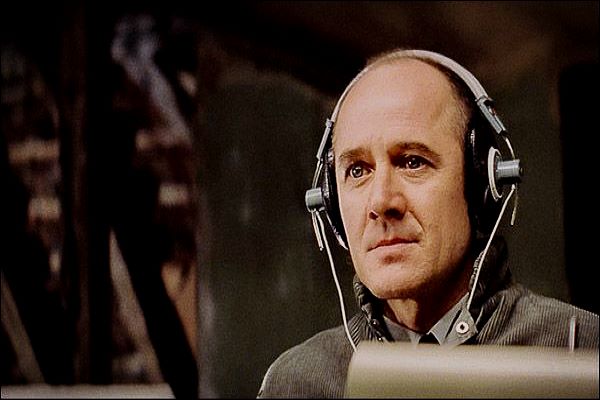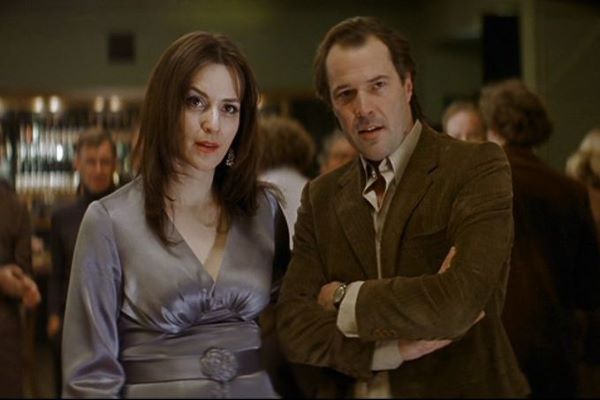Florian Henckel Von Donnersmark’s political thriller spy film The Lives of Others vividly shows how citizens suffer when a country does not believe them and doubts their activities. Their basic civil and human rights are violated through state-sponsored mechanisms. All the time, ordinary citizens are kept and monitored under strict surveillance without their knowledge and permission. East Germany or the German Democratic Republic (GDR) did exactly the same to its countless innocent citizens through its secret state security service also known as Stasi.
This film chronicles the story of an internationally renowned German Playwright, Georg Dreyman (Sebastian Koch), who is kept under strict surveillance by the Stasi in East Germany in 1984 before the fall of the Berlin Wall. However, the deployed Stasi captain Gerd Wiesler (Ulrich Muhe) soon realizes that Georg is innocent and follows socialism, which shifts his perception toward Georg and he becomes more and more sympathetic toward him and saves him from Stasi. Filmmaker Donnersmark highlights through this film how a person under strict state supervision can, still, hold independent ideologies and action them. The Lives of Others also shows that a good samaritan can exist and have courage even in a fully authoritarian or totalitarian state.
The film starts with the Stasi captain, Gerd Wiesler, who is an expert in criminal interrogation, teaching the new joiners interrogation procedures in 1984. During the training sessions, he is instructed by his manager, Anton Grubitz (Ulrich Tukur), to bug and spy on internationally renowned playwright Georg Dreyman. Wiesler and his team reach Dreyman’s apartment secretly and set up the surveillance equipment and wires. A small workstation is created in the attic of the same building, and surveillance equipment is set up there as well. Wiesler and his colleague monitor all the Dreyman’s activities from the attic.

Wiesler soon comes to know that minister Bruno Hempf (Thomas Thieme) lusts for Dreyman’s girlfriend Christa-Maria Sieland (Martina Gedeck), a famous stage actress and frequent Dreyman collaborator, and the minister wants to frame, humiliate, and arrest him for that. Christa-Maria has a secret love affair with Bruno Hempf who forces her to engage in sexual intercourse in exchange for her excellent career as an actress in GDR and wide access to illegal drugs. Wiesler connects with Dreyman’s calling bell and makes him see Christa-Maria getting off Hempf’s car presumably after sexual intercourse. Dreyman urges her to end her affair with Hempf. She agrees to that and reconciles with Dreyman.
Dreyman’s friend and collaborator Albert Jerska, a blacklisted theater director, commits suicide. Dreyman decides to write an anonymous article in Der Spiegel, a renowned West German newsweekly, on suppressing the numbers of rising suicides by GDR. An editor of the newsweekly smuggles an ultra-flat typewriter for Dreyman as all the typewriters are identifiable and tracked by the Stasi. Dreyman hides that typewriter under the floorboard although Christa-Maria gets to see it by chance. Dreyman’s article is published in Der Spiegel causing much embarrassment and damage to GDR.
Being rejected by Christa-Maria, Bruno Hempf orders Grubitz to arrest and blackmail her to admit that Dreyman is the author of the Der Spiegel article. When Grubitz has her interrogated by Wiesler, she reveals the location of the typewriter in Dreyman’s apartment. However, before Grubitz’s arrival at the apartment with the Stasi officials, Wiesler hides the typewriter from its previous location. So, Grubitz fails to trace it. Realizing that she has betrayed Dreyman, a guilt-ridden Christa-Maria runs out of the apartment, gets hit by a truck, and dies in Dreyman’s arms. Grubitz abandons the mission and informs Wiesler that his career is over. He will have to spend his remaining years with Stasi in dept M, a dept for the disgraced Stasi officials. While working in his department on 9th Nov 1989, Wiesler hears the news of the Fall of the Berlin Wall on the radio. He gets up and silently leaves the office.
Two years later, Dreyman meets Hempf during a performance of Dreyman’s play. When He asks Hempf why he was never bugged in GDR, Hempf replies that Dreyman was bugged and the Stasi had full information about him. Dreyman reaches his apartment and finds out the wires and audio devices behind the switchboard. Dreyman looks into the Stasi files in the Stasi Records Agency and discovers that Stasi officer HGW XX/7, who is none other than Wiesler, hid all his activities from the Stasi and shifted the typewriter. He tracks down Wiesler, who now distributes advertisement brochures, and sees him from a distance, but stays away from meeting him. A few years later, while walking past an inauguration poster of Dreyman’s new novel Sonata of a Good Man, Wiesler enters the shop and discovers that the novel is dedicated to HGW XX/7 in gratitude. He buys a copy and the shopkeeper asks if he wants the copy to be gift-wrapped. Wiesler replies, “No. This is for me.”

The Lives of Others vividly shows how a state can interfere with the lives of its innocent citizens. Their basic civil and human rights are denied. They are kept under strict surveillance and all of their activities are secretly monitored. Common citizens are often blackmailed and forced to be a part of the state machinery. If a citizen is guilty of a crime, the state has all the right to sentence him. But, bugging citizen apartments is strictly condemnable. This highly condemnable act was seen not only in GDR but in multiple countries. It exists in many countries even today.
The Lives of Others also shows that some citizens, still, possess free will even in a notoriously authoritarian state. They risk their lives and have the courage to hold their free spirit to criticize the government. The state can’t really break their indomitable spirit and rebellious mind. They do not necessarily fight with guns all the time. Some are artists and fight through their art. In the film, Dreyman fights through his writing. He risks his life to publish a controversial article in a West German newsweekly. In spite of knowing the consequences, he has the courage to march on. Multiple times, these citizens change an entire state mechanism.
The Lives of Others also focuses on how the perception of a state official changes, and he transforms into a citizens ally. Like the rebels, he too risks his life to support the citizens and ensure their safety and security. Wiesler initially thinks Dreyman is an arrogant anti-state person. But, he realizes slowly that Dreyman is not a culprit and he is being framed because of Hempf’s lust for his girlfriend Christa-Maria. So, Wiesler starts supporting Dreyman and hides all his activities. Dreyman too acknowledges his favor by dedicating his new novel Sonata of a Good Man to him.
The Lives of Others is largely based on the life of Ulrich Muhe, who plays the Stasi official Wiesler in the film. Muhe’s wife Jenny Grollmann was believed to be a Stasi agent who revealed his activities to Stasi. However, it was found later that she was blackmailed and Stasi officials themselves mostly manipulated the information about Muhe’s activities. Filmmaker Donnersmark also wrote the screenplay of this film. He made an outstanding political thriller and spy film without many actions or stunts. His outstanding direction is coupled with Gabriel Yared’s brilliant thrilling and suspenseful background score. Music flows as par with the subject of the film.
The most striking phenomenon of the film is Ulrich Muhe’s portrayal of Stasi captain Wiesler. He depicts the character through outstanding facial expressions and calmness. His well-composed acting has made the film quiet but incredibly dynamic. Martina Gedeck as Christa-Maria looks brilliant, elegant, beautiful, and at the same point of time broken and exhausted. The entire cast is incredibly powerful. Sebastian Koch as Georg Dreyman looks handsome and justifies his character. Multiple times, the greyish lighting is filled with shadows, which gives the film a suspenseful look. The Lives of Others won the Oscar for Best Foreign Language Film at the 79th Academy Awards. It won the BAFTA Award for Best Film not in the English Language at the 61st BAFTA Awards. The film was also nominated for Best Foreign Language Film at the 64th Golden Globe Awards.
